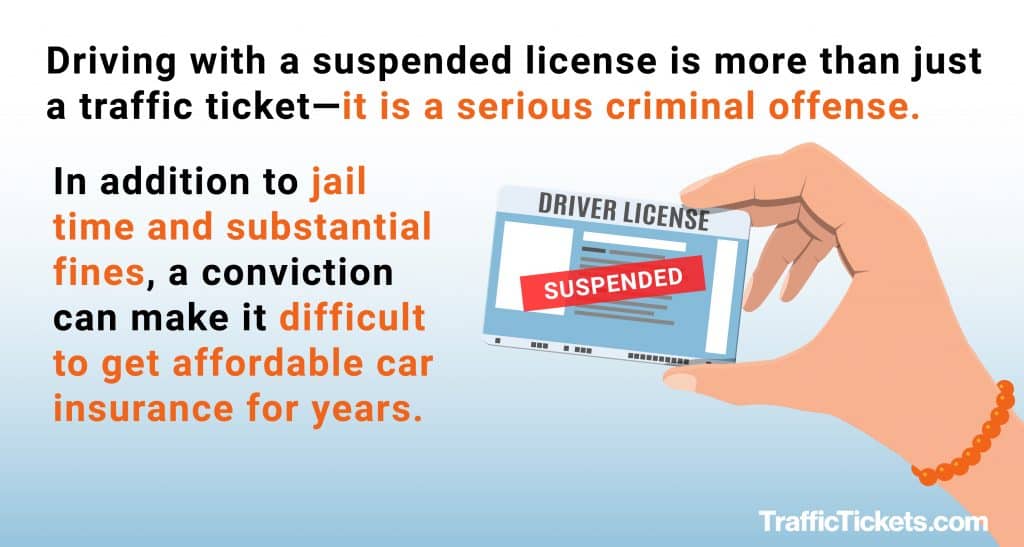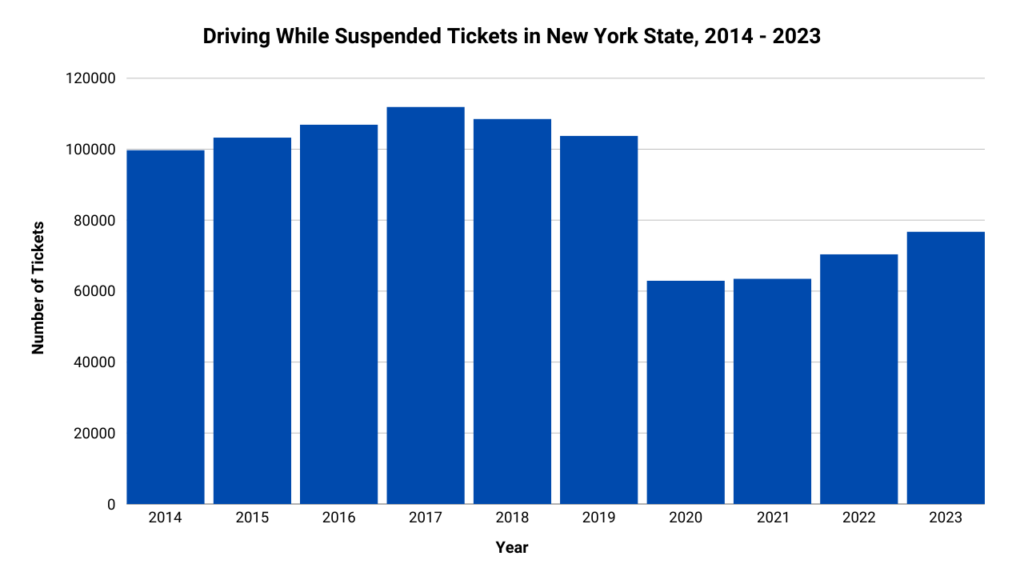Driving with a suspended license in New York is called Aggravated Unlicensed Operation (AUO). This is a misdemeanor offense punishable by a fine of $200–$500, a mandatory surcharge, and possible imprisonment up to 30 days or probation.
Here are some of the specific consequences for driving while suspended:
Criminal record: Driving on a suspended license is classified as a criminal offense in New York. The formal charge is called Aggravated Unlicensed Operation (AUO). There are three levels of AUO in New York. Third- and second-degree AUO are misdemeanors, while first-degree AUO is a felony. A conviction means having a permanent criminal record, which can affect many aspects of a person’s life from employment to housing opportunities, and even immigration status.

Jail time: Drivers caught driving while suspended risk a jail sentence upon conviction. Drivers can spend up to 30 days in jail for AUO in the third degree; up to 180 days in jail for AUO in the second degree; and up to four years in jail for AUO in the first degree.
Fines: The cost of a conviction for driving on a suspended license in New York depends on the severity of the charge. Third-degree AUO can cost $200 to $500. Second-degree AUO can cost $500 to $1,000. In the most severe cases, first-degree AUO can cost $1,000 to $5,000.
| Degree of AUO | Fine | Max. Jail Sentence | Criminal Charge |
|---|---|---|---|
| Third Degree §511-1 | $200 to $500 | Up to 30 days | Misdemeanor |
| Second Degree §511-2 | $500 to $1,000 | Up to 180 days | Misdemeanor |
| First Degree §511-3 | $1,000 to $5,000 | Up to 4 years | Felony |
Auto insurance premium increase: Driving while suspended in New York can cause insurance premiums to skyrocket. While the exact amount varies, rates can go up by as much as 40 percent. He/she will also be classified as a high-risk driver and very likely could get dropped by the insurer altogether.
Penalties for AUO (Driving While Suspended) Conviction
Here are the penalties for AUO by degree.
Third-Degree AUO
- Possible fine between $200 to $500
- Potential jail time up to 30 days
- Penalties for vehicles weighing 18 thousand pounds or more: possible fine of $500 to $1,500, potential jail sentence of up to 30 days
Second-Degree AUO
- Mandatory fine of at least $500
- Mandatory jail sentence of no more than 180 days or probation or a combination of both
First-Degree AUO
- Mandatory fine between $500 and $5,000
- Mandatory jail sentence of up to two years or probation or a combination of both
Conditional Licenses
The DMV may issue a conditional license to a driver whose regular license has been suspended or revoked due to a violation related to drugs or alcohol. However, the conditional license does not allow someone to operate a vehicle that would usually require a commercial driver’s license (CDL). Also, the DMV can issue a restricted license for a driver with a license that has been suspended for reasons unrelated to drugs or alcohol.
Why May A Driver’s License Be Suspended
A driver’s license may be suspended for a variety of reasons. Depending on the reasons for suspension, a license suspension can be definite or indefinite.
Definite Suspension
A definite suspension lasts for a predetermined period of time. Some common reasons for a definite suspension include:
- Lack of automobile liability insurance
- Conviction on alcohol or drug charge
- Too many unpaid traffic tickets
- Failing to follow rules for junior drivers
Indefinite Suspension
An indefinite suspension is not limited to a specific period of time. Some common reasons for an indefinite suspension include:
- Failure to answer a traffic ticket
- Failed to pay a Driver Responsibility Assessment
- Failed to file a required vehicle accident report
- Failure to pay child support
- Unpaid New York state tax liabilities
- Lack of automobile liability insurance
How to Fix a Suspended License
There are specific steps required to have a suspended license restored. In the case of a definite suspension, after the suspension period has ended, the driver can pay a $50 fee to have the suspension ended.
Suspension due to failing to answer a traffic ticket or pay a fine, mandatory surcharge, or crime victim assistance fee will require a $70 fee to have the suspension lifted.
Important: A person convicted of driving on a suspended license can end up with a criminal record.
Conditions for NY AUO (Driving While Suspended) Charge
- Third Degree AUO
- Found to be operating a motor vehicle with knowledge that their license has been suspended or revoked.
- Second Degree AUO
- Has been previously convicted of AUO in the third degree within the last 18 months;
- Suspension or revocation is based upon a chemical test refusal;
- Suspension was a mandatory suspension pending prosecution for charge of driving while intoxicated;
- Has three or more suspensions imposed on at least three separate dates for failure to appear, answer or pay a fine.
- First Degree AUO
- Operating a motor vehicle while under the influence of drugs or alcohol, along with a previous second-degree AUO;
- Committed the offense while having in effect 10 or more suspensions, imposed on at least 10 separate dates for failure to answer, appear or pay a fine;
- Committed the offense while under permanent revocation resulting from three DWI convictions or three refusals to submit to a chemical test (or any combination thereof), as well as from two DWI convictions resulting in serious injury or death.

Hiring an Attorney to Fight a Driving While Suspended in NY Charge
Driving with a suspended license is more than just a traffic ticket—it is a serious criminal offense. In addition to jail time and substantial fines, a conviction can make it difficult to get affordable car insurance for years. It is urgent that any driver facing a charge of driving while suspended hire a qualified NY traffic ticket attorney to reduce the charges, minimize the fines, and avoid both a criminal record and the risk of jail time.
Common Defenses to Aggravated Unlicensed Operation (AUO)
Pursuant to the AUO statute, if at the time of getting ticketed the driver held a license from a foreign country, state, territory, or federal district permitting him/her to drive in New York, then he/she cannot be convicted of driving while suspended in New York. However, most drivers do not fall into this limited category. For those with only a New York license, do not lose hope! There is a great defense that good attorneys implement in order to help fight this charge.
If enough evidence is garnered, a defense that usually is quite successful is called the “lack of knowledge” defense. According to the statute (see above), in order for a driving while suspended charge in NY to hold up, the driver must have known or should have known that the license was suspended. A New York driver’s license can be suspended for a number of reasons that can catch the driver by surprise. The following are the ones that most drivers are unaware of:
- Being convicted of speeding 3 times within 18 months
- Being convicted of speeding twice in a construction zone within 18 months
- Accumulating 11 points within 18 months
- Failing to respond to or pay a New York traffic ticket (including cell phone tickets, seatbelt tickets, etc.)
This defense will almost always result in a reduction or outright dismissal if the driver can present concrete evidence that he/she honestly had no idea that the license was suspended because they
- Did not receive any written notice of the suspension (i.e. mail, e-mail, etc.)
- Did not receive any verbal notice of the suspension (i.e. phone call, etc.)

and as a result could not have been expected to know that the license was suspended.
If the reason the person was not aware of the suspension is because he/she did not open their mail (even though the DMV sent a letter regarding the suspension), then it will be much harder to successfully mount a “lack of knowledge defense.”
In such a case, a prosecutor will likely say that the driver should have known under the circumstances because a person of normal sensibilities checks their mail regularly and would have found out from the sent letter. Remember, make sure to give all of the facts to a NY traffic ticket attorney and supply him with any documents received regarding the suspension. Doing this will allow him to help construct the best defense possible. Just because you might be guilty in the eyes of the law doesn’t mean a skilled attorney can’t negotiate or argue you out of it. An experienced attorney will know how to negotiate the best outcome possible regardless of the circumstances.

Need help with your driving while suspended charge?
Call Now - We've Fought Over 50,000 Traffic Ticket Cases
Quick, free, and no obligation.
Case Law Analysis
The case law in New York regarding driving while suspended license tickets reveals a little-known insight into defeating the AUO charge.
In People v. Pacer, 847 NE 2d 1149, the prosecution attempted to introduce an affidavit prepared by an official at the DMV claiming that all of its notice procedures were followed effectively. Additionally, the prosecution admitted that the affidavit was a “sworn document prepared by a government official specifically for use by the prosecution at trial” (see People v. Pacer, 6 N.Y.3d 504).
Did you
know?


Kent Ng
Cleverly, the defense attorney cited a famous Supreme Court case, Crawford v. Washington, to help his client. In Crawford, the Supreme Court ruled that testimonial statements that were not previously subjected to cross-examination are inadmissible against a criminal defendant (see Crawford v. Washington, 541 U.S. 36).
The defense attorney used this precedent to argue that the affidavit constituted the paradigmatic piece of evidence that Crawford required to be excluded.
In an amazing ruling, the court in Pacer found:
- Here, the affiant’s sworn statement—that she had information causing her to believe that the Department actually mailed notice of revocation to defendant—was crucial to the People’ case. Faced with evidence of this type, defendants have no means of challenging the People’s proof on a critical element. Without an opportunity to cross-examine the affiant, defendant had no chance to inquire about the basis for the affiant’s “information and belief” that the Department mailed the notice. Defendant had no chance to inquire whether the Department sometimes makes mistakes in mailing revocation notices; whether there were other drivers in the Department’s database with the same name as defendant to whom the Department might have mailed the notice; to what address the affiant believed, based on her information, the Department had mailed the notice; whether the notice might have been returned undelivered; or whether the affiant could testify reliably about procedures as they existed 16 years earlier. In short, the lack of a live witness to confront eliminated defendant’s opportunity to contest a decisive piece of evidence against him.
People v. Pacer, 6 N.Y.3d 504, 509.
What does all of this mean for a driver charged with AUO? Anyone ticketed with AUO in New York now knows that if any affidavit is being used against the driver by the DMV (or a similar kind of written document), but the author of that document is not willing to come to court to be cross-examined by the defense attorney at trial, New York law requires that the document be excluded from evidence and not used against the driver!
This case is a great weapon that any traffic ticket attorney trying AUO cases should use whenever he or she finds it applicable.
It is crucial to remember that the prosecution bears the burden of proof even in an driving while suspended case. This means the prosecution must be able to show that you knew or should have known about the suspension. If an attorney can eliminate such evidence based on this precedent, the driver is well on his/her way to a lesser offense or an outright dismissal.
For more information about driving with a suspended license check out our Driving While Suspended e-book.
Notice: New York State cannot suspend an out-of-state driver's license, but it can suspend the person’s privilege to drive within the state.
Out-of-State Drivers
New York law enforcement can easily look up a driver’s license to see if it is suspended. But can an officer in New York tell if an out-of-state driver’s license has been suspended? The answer is, usually but not always. Thanks to something called the Driver’s License Compact, police officers in New York State (and other participating states) can look up an out-of-state driver’s license during a traffic stop in New York. If the out-of-state license has been suspended, then the New York-based officer can issue a ticket for driving while suspended. Out-of-state drivers still face the same fines, sentencing, and criminal charges as a New York driver. In addition, an out-of-state driver who is convicted of driving while suspended in New York can see the charge appear on their driving record, which will also affect their auto insurance rates.
Key Takeaways
- A person cannot be convicted of AUO if he or she was not notified of the suspension in writing or over the phone by the DMV.
- This defense only works if the communication error was caused by the DMV.
- If a driver fails to inform the DMV of a change in contact information (i.e. address and phone number), then the driver is still liable.
- Even when the facts of a case are not in favor of the driver, a skilled attorney may be able to negotiate a reduction in penalties.
Common Questions
- Can you go to jail for driving with a suspended license?
Yes. The lowest-level charge for driving while suspended in New York can result in up to 30 days in jail. For the highest-level charge, a person could spend as much as four years behind bars.
- Is it a felony to drive with a suspended license?
In most cases, no. But AUO in the first degree is a felony. There are several circumstances that can result in a first-degree AUO charge (see the chart above).
- If my license is suspended in New York, can I still rent a car in another state during the suspension period?
In most cases, no. Any reputable car rental company will deny the rental application if the driver’s license is suspended.
- Can I get a license in another state if my NY license is suspended?
No. Nearly all license applications in the U.S. ask if the applicant has a suspended license from another state. Those who lie and are caught could face even more serious charges.
- If you give a police a valid out-of-state license will they see your New York suspension?
It depends on the circumstances but very likely, yes. If the out-of-state license is still current and valid, then a suspension in New York is likely to appear on the out-of-state driving record. It’s also possible the out-of-state license will be suspended in response to the New York suspension.
Data on Driving While Suspended in New York
Total Number of Citations for Driving While Suspended in New York State
| Year | Number of Tickets |
| 2014 | 99,750 |
| 2015 | 103,260 |
| 2016 | 106,955 |
| 2017 | 111,945 |
| 2018 | 108,547 |
| 2019 | 103,802 |
| 2020 | 62,946 |
| 2021 | 63,507 |
| 2022 | 70,393 |
| 2023 | 76,777 |
Data from the Institute for Traffic Safety Management & Research shows that New York law enforcement officials in 2023 issued more 76,777 tickets for Aggravated Unlicensed Operation (AUO), also known as driving while suspended. This is a 10.8% increase over 2022, in which 70,393 tickets were written.
Suffolk County issued the most tickets for driving while suspended in 2023, with 14,832 tickets written. This is twice as much as the next-highest county, Nassau, which handed out 7,581 tickets. Lastly, Erie handed out 4,780 tickets, making it the third county with the most AUO tickets that year.
It is nearly impossible to tell if a driver’s license has been suspended until after the officer has had a chance to check it during a traffic stop. Thus, a person is most likely going to be charged with AUO after being pulled over for another infraction such as speeding, cell phone or texting violations, or seat belt violations.
The facts are clear: driving while suspended is a serious charge and the likelihood of getting caught is very high. A conviction for driving on a suspended license in New York can have a serious long-term impact on one’s life, including the ability to drive, obtain insurance, get a job, and more, in addition to the risk of jail time.

AUO FAQs
What happens if you get caught driving with a suspended license in New York?
Driving with a suspended license in New York is called Aggravated Unlicensed Operation (AUO). This misdemeanor offense is punishable by a fine of $200 to $500, a mandatory surcharge, possible imprisonment for up to 30 days, and probation. Your auto insurance premiums will also almost certainly increase.
How long does a suspended license stay on your record in New York?
In New York, how long a suspended license remains on your driving record depends on the type of suspension. Most suspensions are displayed on your driving record abstract for four years from the date the suspension ended. However, if the suspension is due to a chemical test refusal, a suspension stays on the record for five years from the date of suspension.
Can you drive in another state if your license is suspended in New York?
Most states, including New York, share driving offense information through the Driver License Compact (DLC). This means a suspended license in one state that is party to the DLC is usually suspended in other participating states, too. However, New York can suspend the driving privileges of out-of-state drivers within New York while still allowing them to drive in other states.
Can you get charged with AUO in New York if you don’t have a NY license?
Yes. If either your home state driver’s license or your NY driving privileges are suspended or revoked you can get charged with AUO. A common example is an out-of-state driver who gets a NY traffic ticket and fails to respond to it. NY will suspend that person’s NY driving privileges (even though he holds a license in a different state) and if he’s caught driving in NY he will be charged with AUO.
How much does it cost to unsuspend your license in New York?
When reinstating a driver's license in New York, applicants typically need to follow several steps, including serving any required suspension or revocation period, submitting specific documents, and paying fines. Details about the suspension are provided in the DMV notice, and drivers must review it thoroughly before starting the restoration process.
What is an Aggravated Unlicensed Operation (AUO) charge in NY?
In New York, Aggravated Unlicensed Operation (AUO) involves driving a vehicle while your license or New York driving privileges are suspended or revoked. Charges can vary in severity based on factors like prior offenses or the reason for the suspension. Penalties can include fines, potential jail time, and extended license suspension. Promptly addressing license issues is crucial to avoid AUO charges.
Can I be fined for driving with a suspended license?
Yes. If convicted of driving with a suspended license, you may be fined up to $5,000.
What if I did not realize that my license was suspended?
Your attorney may be able to argue for a reduction in penalties or a complete dismissal of charges based on your lack of knowledge of the suspension.
Can a police officer tell if I have an out-of-state license that is suspended?
A police officer may be able to see if your out-of-state driver’s license is suspended, depending on if the state participates in the Driver’s License Compact program.
Can I be cited for other violations along with driving with a suspended license?
Yes. It is highly likely that you were pulled over for another type of driving violation prior to the police officer discovering your driver’s license was suspended.






